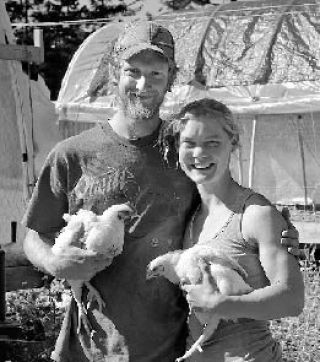There is a lot of interest in grass-fed, pastured, humanely raised cattle, sheep, pigs and goats. Especially with the recent 10th anniversary of the Island Grown Farmers Cooperative and its Mobile Slaughter Unit that have made raising these animals profitable for local farmers.
But what about chickens? Can they be raised on pastures as humanely and profitably as their four-legged relatives are?
Blake Johnston and Julie Bottjen, who raise Cornish Cross meat chickens on two pastures here on Lopez, told me that while there are challenges, it’s possible and preferable, and even profitable, to pasture-raise meat chickens. I visited them and their chickens recently at Lopez Island Farm where, they said, “Bruce Dunlop is allowing us to use about an acre and a half of ground in his orchard.”
Spread out across a 50 by 150 foot area defined by a portable electric fence, the chickens were foraging on buckwheat, triticale, rye and clover and stopping occasionally at grain-filled gutters that crossed their pasture at regular intervals. In the center of the space, looking like gypsy caravans, were two mobile chicken coops. “They are actually greenhouses that I’ve built up on mobile home axles,” Blake explained. These above-ground chicken houses provide the chickens a place to go at night but leave them free to roam during the day.
Blake was busy stretching bird netting across their pasture area because a hawk and a raccoon had begun preying on the chickens. “It’s going to be faster for me to cover their whole run with bird netting and move that as often as I need to than it is for me to stay here,” Blake explained.
While he isn’t satisfied with this defense system yet, he’s clear that the benefits to the chickens of pasture life outweigh these challenges. “Our chickens are just healthier,” he said. “They forage, they fly. They are chickens. The more we treat them like a life as opposed to a unit or a commodity the more success we have.”
The Cornish Cross chickens they raise are reputed to have weak leg bones but, “If you let them out into the sunshine, this natural source of vitamin D, they don’t have the leg problems. And even if my chickens get wet they don’t get pneumonia. If you treat them with respect they stay healthy.”
Chickens grow really fast and in eight to 10 weeks they are ready for slaughter. Unfortunately, the Mobile Slaughter Unit “doesn’t help because we can’t use it for chickens.” Instead, Blake said, “we rent equipment from the Northwest Ag Business Center (NABC) and process them ourselves.”
“We follow regulations that are set out by the WSDA for a small poultry processor. We are permitted. Instead of bleach, we use vinegar for sterilization. We use stainless steel and food grade containers. We’ve been doing it for along time and we have a system down to keep everything clean because it’s in our best interest to have the best product possible. We chill them and people pick them up within 48 hours and freeze them at home.”
Turning to why he and Julie raise meat chickens Blake said, “The chickens have been my main focus here for the past year because I know chickens really well. I’d been raising meat birds for over a decade near Seattle with my mother. On Lopez it is something people will pay me to do.”
Continuing, he said: “The major difficulty that I have is not technical or philosophical or even the market. The major challenge is just being a young, landless farmer. That’s the hardest part.” But, with the optimism of a 24-year-old, he turned to what’s easy: “Overall just being motivated is probably the easiest thing. Having a desire to push things to a more sustainable level. I have a very strong desire to make a living farming and producing food. I grew up farming and found that it was something that I really loved.”
To buy Blake and Julie’s chicken, pick up an order form at Blossom, at the Lopez Farmers’ market or email them at bgrowen@gmail.com for birds that will be available the third week of September. And in January, watch for the announcement of their 2011 vegetable CSA.



